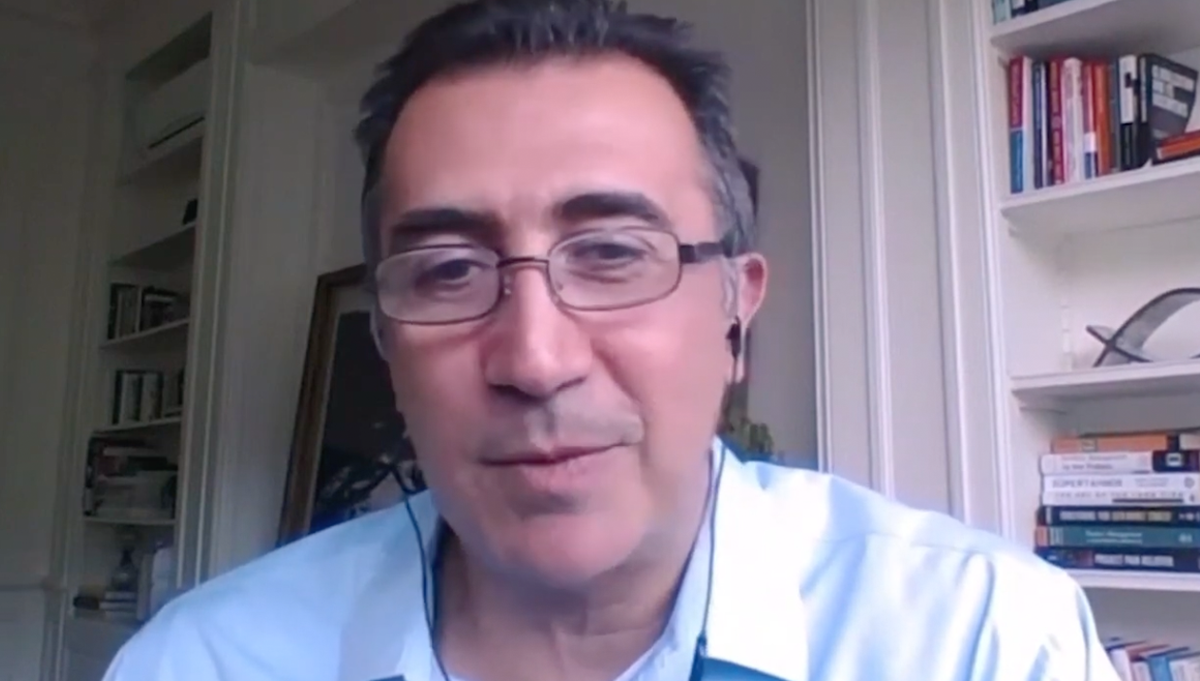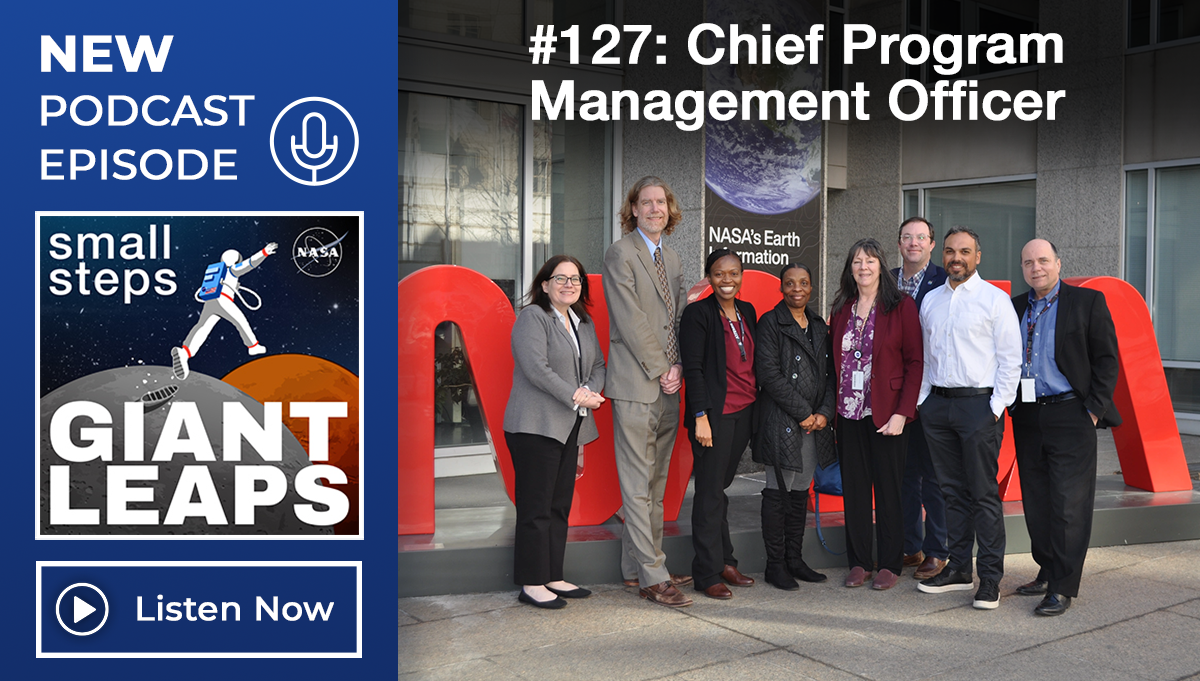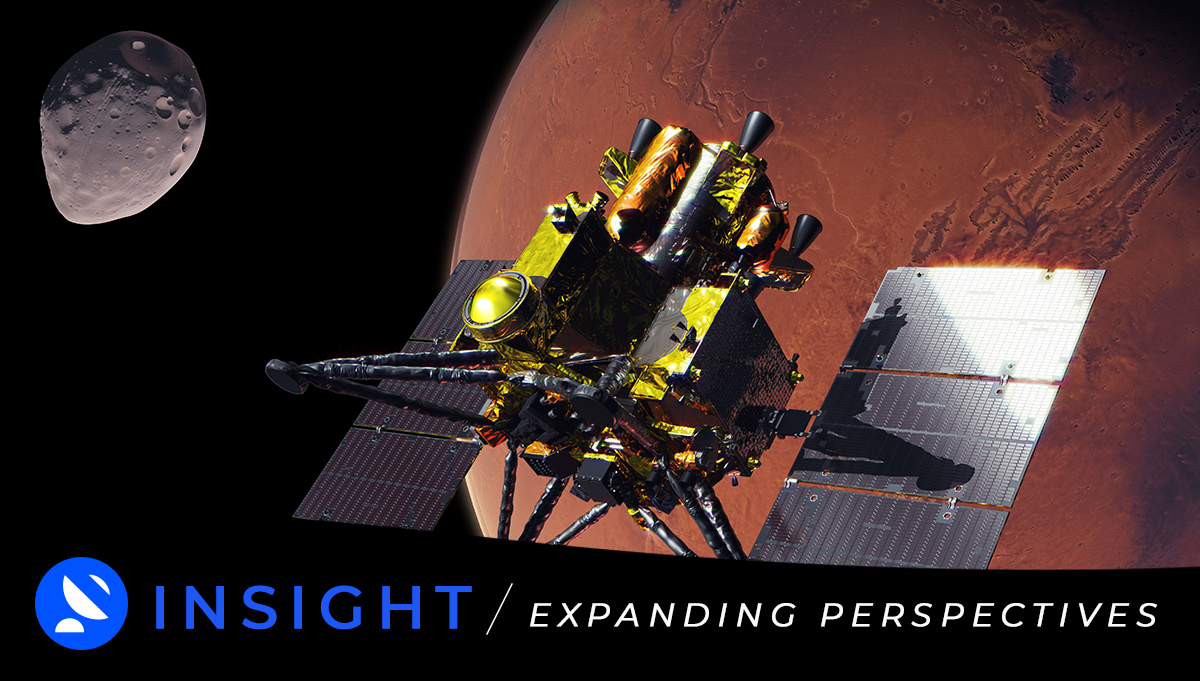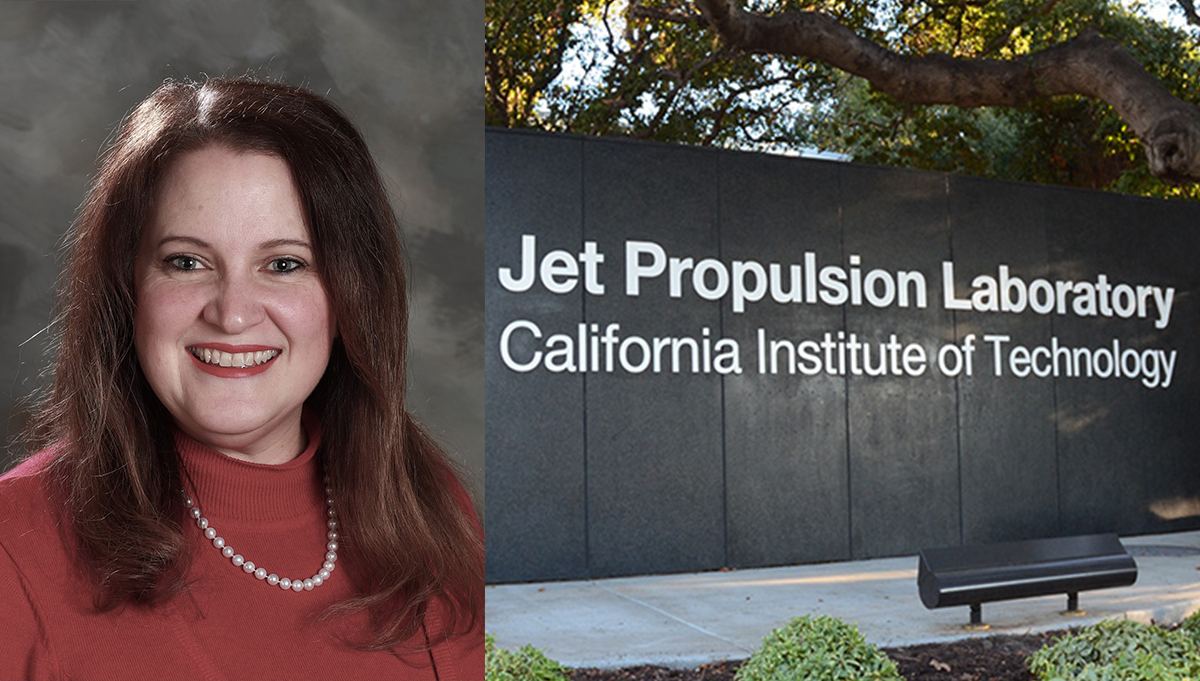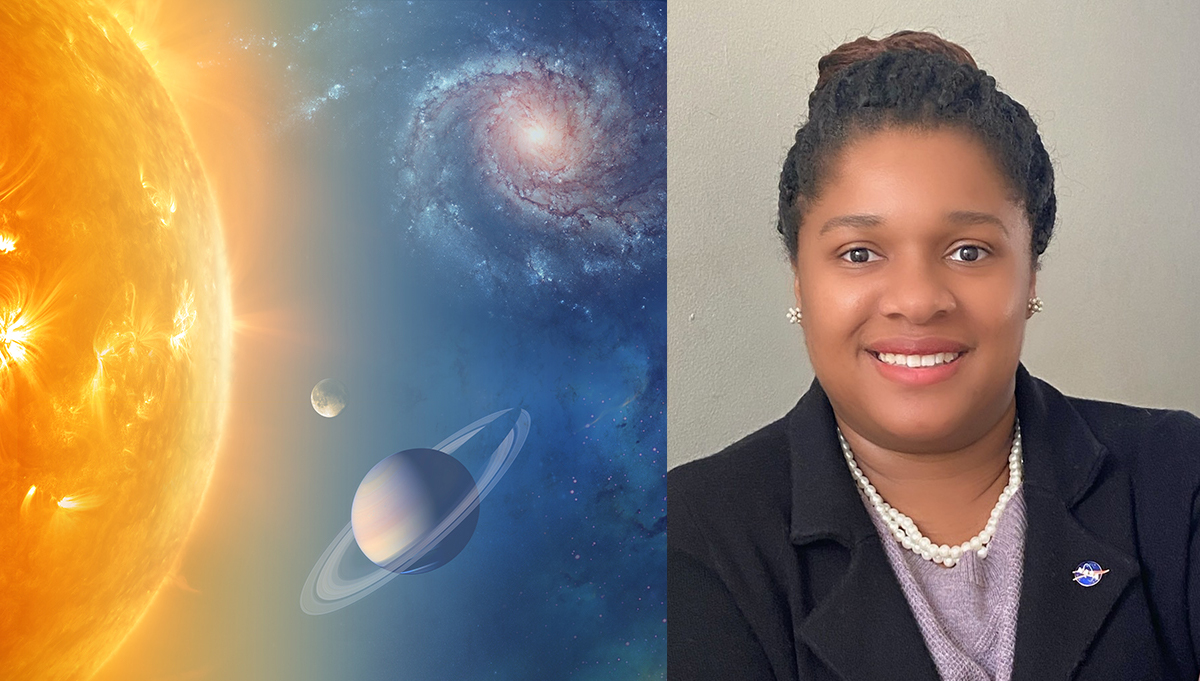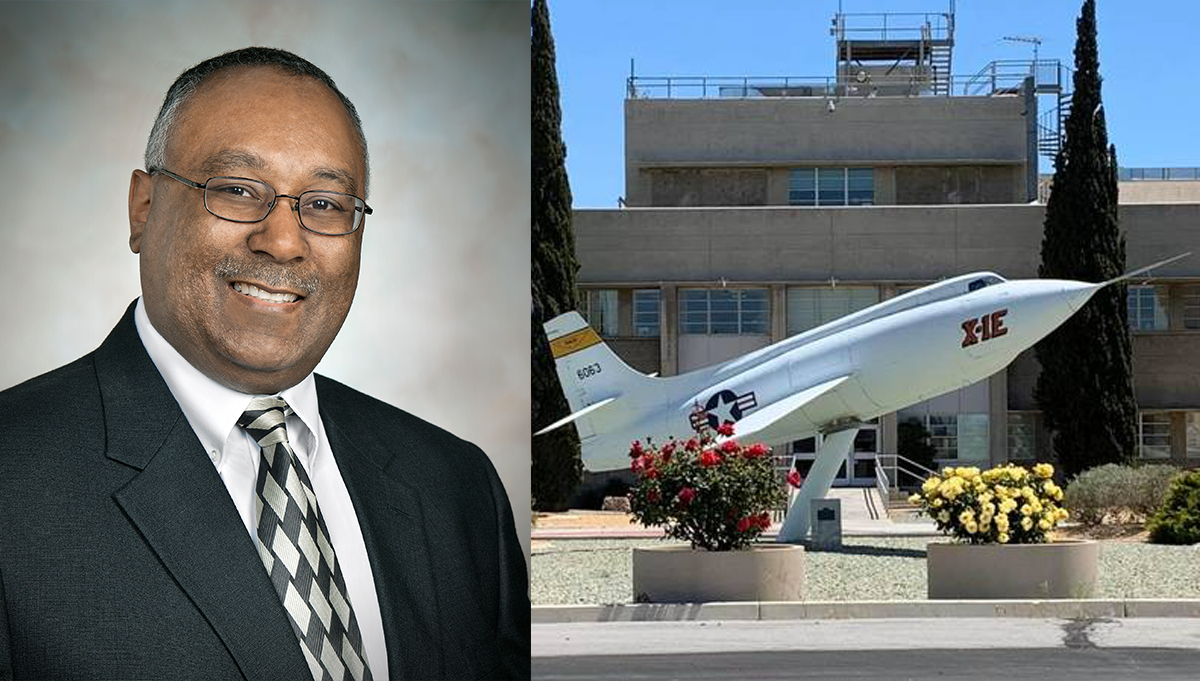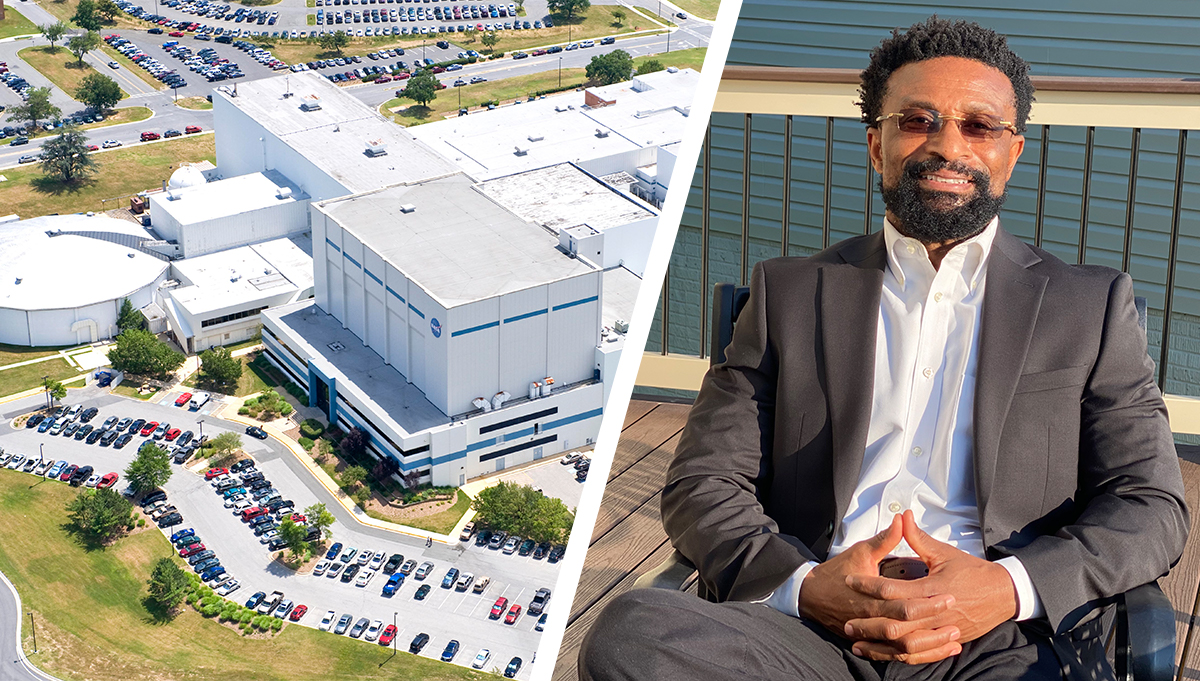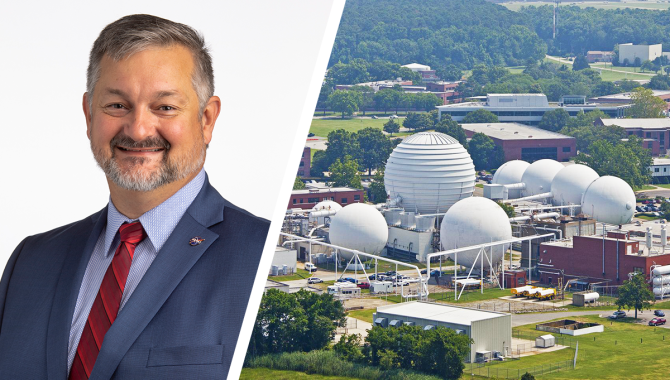
Langley Research Center CKO Kevin Rivers.
Credit: NASA
Kevin Rivers discusses knowledge sharing at NASA’s Langley Research Center.
Kevin Rivers serves as the Chief Knowledge Officer (CKO) at NASA’s Langley Research Center (LaRC). Rivers is the Associate Center Director, Technical at LaRC, leading strategy and transformation of the center’s technical capabilities to ensure NASA’s future mission success. He is particularly focused on accelerating Langley’s internal and external collaborations as well as the infusion of digital technologies that support the center’s ability to thrive in an increasingly digitally enabled, hyperconnected, fast-paced and globally competitive world. Rivers previously served as Director of the Research Directorate, providing executive leadership to Langley’s largest organization. During his Langley career, he has served as research engineer, project technical lead, branch head and project manager. In these prior assignments, Rivers led the development of advanced structures technologies for future spacecraft, an on-orbit repair for the space shuttle wing leading edge, and the integrated vehicle design and analysis for the historic Ares 1-X flight test.
What are your thoughts on how knowledge sharing affects mission success?
Wow, so we don’t have mission success if we don’t have knowledge sharing. We share knowledge every day, and whether we formally do it or not, we’re sharing knowledge — even in casual interactions.
I would say knowledge sharing is essential to mission success for several reasons. It is essential that we learn from our mistakes and that we learn from our successes in things that we’ve done in the past and apply them to things that we’re doing now and in the future. We need to be careful about this because new methods, new tools and new technologies arrive, and we have to integrate those into what we do. So, we can’t just build a rigid set of processes based on old technology, old processes and old methods. We definitely need to take the time to integrate what we’ve learned moving forward, so that’s the first step in general. We do something, we learn a little bit about how that went, and we play that into our future missions, which makes us more successful, more efficient and more effective.
People often think that knowledge is specific to a person. I’ll give you a quick story. I was a project manager when we were returning to space shuttle flight. I was managing one of the small efforts to develop an on-orbit repair so the astronauts could go out and fix the shuttle leading edge if it had damage. We had a little team distributed across the country and a lot of experts who were very, very deep in their domain area, and we developed what we call a ‘bus factor.’ What would be the impact on my project if you got hit by a bus? Some had very high bus factors, and some other people not so high. And that wasn’t a character judgment, but it sort of conveys the importance of knowledge sharing because we are humans, we’re fallible, and things can happen to us, or we can move on to other things. If we’re not actively sharing what we know with those around us, then we bring a lot of risk into successfully delivering on our missions. If we’re not hoarding information but we’re sharing that information, then we are ensuring that our team can be successful with or without us.
You could also maybe use the Wikipedia model. Somebody throws something out there, somebody else modifies it, somebody else adds to it, somebody else takes something away from it, and ultimately, the theory is that the knowledge in the end is most accurate and complete.
So, that’s another aspect of knowledge sharing that I think is vital for us. I miss pieces and you miss pieces. I remember a class where they were talking about eyewitness accounts and how the police deal with those. They said if everybody’s account is identical, that’s as suspicious as if nobody’s account corroborates anything. And that’s just kind of a whole concept as humans that we have gaps when we share information with each other. And hopefully, together we can fill out a complete story.
How do you think NASA’s technical workforce benefits from knowledge sharing?
The diversity of NASA’s technical workforce is unlike any other organization, government agency or institute that exists. NASA has an extremely broad and deep set of technical capabilities within its workforce. We have research centers where people are innovating and inventing and working on very, very new ideas and we have operational centers where people are actively maintaining assets. The International Space Station, for example, is monitored 24 hours a day and actually flown from Johnson Space Center by the flight controllers sitting on the ground.
When you think about that gamut of capabilities, very few organizations exist with that breadth of capability. I think it’s very important for the people who are working on new ideas to share knowledge with the people who are operating existing systems and all the phases in between. There’s enormous value in information going both ways. I’m at a research center, so I could talk all day long about how we have great ideas and deep technical knowledge, and we can help these guys and they just need to listen to us and hear our ideas. And that’s a little bit true but it’s also true that we need to listen to them to understand their challenges and problems, to understand where there’s gaps in the technologies and risk that they can’t effectively address. And then we can focus our innovation and research on resolving those issues. So, from a NASA technical workforce perspective, I would say we all benefit greatly if we are open-minded and if we share knowledge between each other so that those people who are operating or developing systems can benefit from the new ideas and the new ways of doing things that are coming out of the research centers. And simultaneously, the research centers can develop relevant technologies if they listen to the folks that are at development centers and operational centers.
Are there any successful knowledge efforts or best practices in your organization that you’d like to highlight?
Yeah, absolutely. We’re doing a lot of things at Langley in the knowledge arena that I believe are fairly innovative and interesting. There’s one area that I would really like to highlight. When I was in the Research Directorate, we would record exit interviews with our retiring senior researchers in an effort to facilitate knowledge transfer as well as establish and sustain healthy mentoring programs, and we’ve kind of taken that idea to the next level. This year we worked to create what we’re calling the Langley Legacy Forum.
We ask folks to nominate candidates — typically, someone who’s reaching the end of their career or getting ready to transition into retirement — and then we choose an individual to receive the Legacy Award. We recognize them for their expertise and their contributions to the agency, and we build a forum around their expertise. So, we interview them, and we try and draw all the knowledge out of their heads that we can get in this interview. And then we put together a moderated panel of experts in that field and have questions and answers with the experts.
I think we had upward of a couple hundred folks who attended the virtual forum, and we recorded it, so it’s now available for the future. The person we chose was a gentleman transitioning into retirement who has spent an enormous number of years in his career as a very successful flight hardware project manager. And so, it was really cool to recognize him for that expertise and capture the knowledge directly from him, and then also to have a panel of people who talked about successes and how things go well and don’t go well and all that kind of stuff.
So, we did our first one this year. We’re really excited about it. This is something that we’re going to try and institutionalize as an annual activity at Langley. We recently gathered our next bucket full of nominees and we’re looking through the nominations to determine who’s next. Our nominees are across the full spectrum from various technical areas to human resources. There’s a lot of diversity there.
Are you observing any trends or cultural shifts that affect knowledge management going forward?
Yes, I see a couple of important trends that are changing things significantly. In my role as the Associate Center Director for Technical, I’m responsible for digital transformation at the center. Jill Marlowe was in my position before she moved to NASA Headquarters as the agency’s Digital Transformation Officer, and she’s very focused on transforming our digital space. My responsibilities include a healthy integration with that, but also looking at transforming our culture.
Historically, we have been very stovepiped. We worked within our branches and within our areas of expertise and we’ve been very successful, but the future is integrated and multidisciplinary and driven by accelerated change. So, we’re trying to change our culture here at Langley to allow our folks to operate very successfully.
One trend is the commercialization of much of the work that we have done in the past, so I think there’s a shift of a lot of work that we have historically done within NASA to the commercial sector. An example is commercialization with low-Earth orbit and launch services and things like that, and that’s changing what we need to do in the future and is going to have an impact on who we are as an agency and what our mission is.
Culturally, the millennials are beginning to matriculate into positions of leadership, and they live and work completely differently than the rest of us. They are digital natives. They’re very comfortable in this digital environment. They’re very comfortable in a distributed, virtual environment. And so, I think all of our work practices are changing, and a lot of that has been accelerated by our response to the pandemic. It’s a shift to more geographically distributed, virtual interaction on a grand scale, and I think those cultural shifts are making knowledge sharing much more vital to our future because you’ve got people that are not geographically collocated. You’ve got people that have to work across multiple disciplines.
And we haven’t seen this at NASA yet, but I believe it’s coming and that is people moving in and out of the workforce more rapidly. We would typically have people come and stay for a 30- or 40-year career and in some cases, even work out of the same office the whole time. But I think in the future people are going to come and do a specific job and they’re going to move on to something else in the private sector or in academia, and then maybe they show up again in the future because their skills are needed, and they’re interested in working for the agency.
So, when you couple those cultural changes together, I think we’re in for massive shifts, and I really think it’s vital that we figure out how to capture and share knowledge. We can’t just rely on the classic model of a new person coming in and studying for years under a senior person in the organization. That model is not going to work in the future. We’re going to need to have very specific ways of documenting things and having access to that information for folks so that they can very quickly get up to speed.
What would you recommend to boost knowledge capture and transfer within an organization?
An aspect of knowledge management that really resonates with me is finding an effective way for someone who’s leaving the organization to leave the knowledge that they gained while they were here with the organization. It might be somebody who’s here on a five-year stint and they’re moving into private industry, or it might be someone who’s been here for 45 years and they’re retiring. There are a few ways that you can do that. Obviously, an individual could sit at a desk and write down everything before leaving, but that may not be the most effective way to capture or transfer knowledge.
We’ve been toying with some techniques to do this, and one that I think has the most potential and could be the most effective is to find ways to retain relationships with these people when they move into other places so that they can be a quick consult. We’re working very closely with our Langley Alumni Association. Typically, it’s been about the retired folks, but I believe in the future that along with the retirees it’s going to be more about people who spent a few years here and then went out into academia or industry. We’re working really hard with that group to try and find ways to tap into their knowledge and expertise and allow them even in retirement to enter into mentoring relationships with some of our new employees so that we can keep that knowledge transfer going.
I’ll give you an example that I heard about one of the big aerospace companies. They invite their retirees to come in and do red team reviews. They’ll be getting ready for a big design review, and they’ll bring these retired folks in and let them just dig in for a few days and beat the idea up and give them input before the company moves into the design review. There’s probably company loyalty or compensation involved, but I think it’s phenomenal and a really cool idea. That’s something that really resonates with me, and it’s how can we keep our ‘claws’ in people when we no longer have a right to keep our ‘claws’ in them?
I think we need to take as much knowledge as we can and document it as lessons learned and other mechanisms. We can do a better job than we’re doing now in that arena, and I think a missing piece is figuring out how to retain a relationship so that we can continue to access that knowledge base even after they’ve moved into other roles.
What impact are technologies such as machine learning and artificial intelligence beginning to have on your knowledge sharing activities?
I’ll offer one example. We’ve invested in a natural language-capable lessons learned bot. This is being implemented in our systems engineering organization here at NASA Langley and it is drastically changing how they work. It uses machine learning. It’s not quite to artificial intelligence yet, but I think that’s coming. We’re already beginning to see implementation of these tools and how they do change.
I think there are many tasks that humans have historically done that will be taken over by the machines with AI and machine learning and all that kind of stuff, which I believe is going to free up the humans to spend more time ideating. I can have an idea and then I can have a machine ring out that idea for me. So, it’s going to allow us to continue to keep up to speed with accelerated innovation as it moves forward.
What’s the biggest misunderstanding that people have about knowledge?
I think the biggest misunderstanding is that knowledge is a very specific nugget that exists within you or me. And I don’t think they understand the concept that knowledge actually is this body of information that’s shared between individuals and really enables our technological advancement.
And so, I think for that reason people tend to protect information and knowledge. They hoard it. They want to control it. I don’t think they understand that when they do that, they restrict innovation and success whereas when they share that knowledge they actually innovate more, and they are actually more successful.
In my opinion, no great idea came from just one person who was operating with the knowledge that they held within their own brain. I think in many cases, interactions and innovations happen in the spur of the moment, or it’s ideas colliding and things like that.


